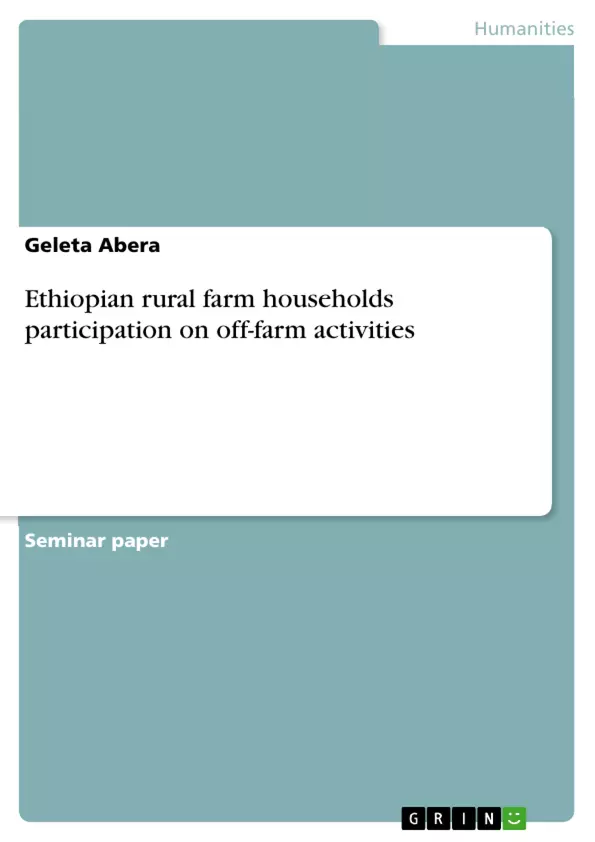This study assesses the determinants of off-farm work participation decisions of farm households in Ethiopia.
Ethiopia is an agrarian society where nearly 85% of the population is directly dependent on farming activities for their livelihood. It accounts for about 50% of the GDP and 90% of the total foreign exchange earnings. Crop production, livestock husbandry and mixed farming are the main types of farming activities in the country. Family labour is the primary farm input for the sector. The agricultural sector of the country is still characterized by low labour productivity, a declining farm size (an average of one hectare per household) and traditional farming systems, natural resources degradation, variable weather conditions, tenure insecurity, weak agricultural research base and extension system, lack of financial services, imperfect agricultural markets and poor infrastructure.
Non-farm activities have a great potential to provide employment and additional incomes during the slack season to rural households. In addition, given rising population pressure on agricultural land which results in a decline in land holding per individual, off-farm activities can provide alternative employment. Despite their great potential, rural non-agricultural activities account for less than 3% of the rural labour force.
Inhaltsverzeichnis (Table of Contents)
-
- INTRODUCTION
- Background of the study
- Objective of the Review
-
- LITERATURE REVIEW
- Concepts and Roles of Off-Farm Activities
- Concepts of Off-Farm Activities
- Role of Off-Farm Activities
- Theoretical Framework Of Modeling Selection Bias
- Theoretical Model
- Empirical Studies
- Empirical Evidences from Other Developing Countries
- Empirical Evidences on Ethiopia
- Motives of Livelihood Diversification
- Overview of Livelihood Diversification in Africa
- Household Level Benefits of Off-Farm Activities
- Conceptual Frame Work
-
- Summary and Conclusion
- Recommendation
- References
Zielsetzung und Themenschwerpunkte (Objectives and Key Themes)
This seminar research aims to investigate the factors influencing farm households' participation in off-farm work in Ethiopia. The study explores the relationship between various socio-economic factors and off-farm work decisions.
- The role of human capital, including health and training, in influencing off-farm work participation
- The impact of education and family size on household decisions to engage in off-farm activities
- The relationship between access to credit, transfer income, and participation in off-farm activities
- The influence of land ownership and livestock holdings on off-farm work participation
- The importance of understanding the diverse factors affecting off-farm work participation for developing effective policies to support rural households
Zusammenfassung der Kapitel (Chapter Summaries)
- Chapter One: Introduction This chapter provides a background to the study, highlighting the importance of off-farm work as a source of income for rural households in Ethiopia. It also discusses the limitations of the agricultural sector and the potential of off-farm activities to contribute to economic diversification and improve livelihoods.
- Chapter Two: Literature Review This chapter delves into the theoretical and empirical literature on off-farm work, exploring concepts, theoretical frameworks, and empirical evidence from both Ethiopia and other developing countries. The chapter also examines the motivations for livelihood diversification and the benefits of off-farm activities for households. It concludes with a conceptual framework for analyzing the determinants of off-farm work participation.
Schlüsselwörter (Keywords)
The research focuses on off-farm work participation, rural households, and Ethiopia. Key concepts explored include human capital, access to credit, land ownership, livestock holdings, and livelihood diversification. The study aims to contribute to the understanding of the factors influencing off-farm work decisions in Ethiopia, with implications for policy interventions.
Frequently Asked Questions
What are the main factors influencing off-farm work in Ethiopia?
Factors include human capital (education, health), family size, access to credit, land ownership, and livestock holdings.
Why is off-farm activity important for Ethiopian rural households?
Off-farm work provides additional income during slack seasons and offers employment alternatives as agricultural land becomes scarcer due to population pressure.
What percentage of the Ethiopian rural labor force is engaged in non-agricultural activities?
Despite its potential, rural non-agricultural activities currently account for less than 3% of the rural labor force.
How does land ownership affect participation in off-farm work?
The research examines how the size and security of land holdings influence a household's decision to seek income outside of traditional farming.
What are the main challenges facing the agricultural sector in Ethiopia?
Challenges include low labor productivity, declining farm sizes, traditional farming systems, and lack of infrastructure or financial services.
- Citation du texte
- Geleta Abera (Auteur), 2021, Ethiopian rural farm households participation on off-farm activities, Munich, GRIN Verlag, https://www.grin.com/document/1008099



